Understanding Rights of Tenants and Landlords: Key Legal Considerations
As a tenant or a landlord, it is essential to have a sound understanding of your rights and responsibilities. Navigating the legal landscape can be challenging, but with the right knowledge, you can protect your interests and ensure a smooth tenancy or tenancy agreement. In this blog post, we will explore the key legal considerations that tenants and landlords should be aware of.
1. Tenancy Agreements: The tenancy agreement is the foundation of the tenant-landlord relationship. It establishes the rights and obligations of each party throughout the duration of the tenancy. It is crucial to read and understand the terms of the agreement before signing. Key aspects to look out for include the duration of the tenancy, rent amount, deposit requirements, and maintenance responsibilities. For more information on tenancy agreements, you can refer to this related article on SQE 1 Practice Exam Questions.
2. Security of Tenure: Tenants in England and Wales are entitled to certain protections under the law. The majority of residential tenancies provide tenants with a secure or assured tenancy. This means that tenants have a legal right to remain in the property unless specific grounds for eviction can be proven. However, it is important to note that some tenancies, such as those in lodgings or student accommodations, may not provide the same level of security. Understanding your security of tenure rights can protect you from unlawful eviction. If you are preparing for the SQE 1 exam, SQE 1 Practice Mocks FLK1 FLK2 can be a valuable resource.
3. Deposit Protection: Landlords are legally required to protect their tenants’ deposits through a government-approved tenancy deposit scheme. This ensures that the deposit is safeguarded and can be returned at the end of the tenancy, minus any agreed deductions. Failure to protect the deposit can result in financial penalties for the landlord. Tenants should ensure that their deposit is protected and request the relevant information from their landlord. SQE 2 Preparation Courses can offer comprehensive training on deposit protection laws.
4. Repairs and Maintenance: Landlords have a duty to ensure that the property is in a good state of repair and fit for habitation. This includes keeping the property’s structure, heating, water, and sanitary facilities in working order. Tenants should promptly report any necessary repairs to the landlord and allow reasonable access for maintenance work. Landlords who fail to carry out necessary repairs may face legal action from tenants. For more information on tenants’ rights in regards to repairs and maintenance, SQE 1 Preparation Courses are a valuable study resource.
5. Notice Periods: Ending a tenancy requires giving the appropriate notice period. The length of notice will depend on the type of tenancy and any stipulations within the tenancy agreement. It is crucial for both tenants and landlords to understand the notice requirements to avoid disagreements and potential legal implications. Accurate knowledge of the notice periods is essential for the SQE 1 and SQE 2 exams, which is why it is important to consult the SRA SQE Exam Dates.
In conclusion, understanding the rights and responsibilities of tenants and landlords is essential for a successful tenancy or tenancy agreement. By familiarizing yourself with the key legal considerations outlined in this blog post, you can protect your interests and avoid potential legal issues. Remember, knowledge is power, and being well-informed can make a significant difference in your tenant-landlord relationship. For further assistance in preparing for the SQE exams, make sure to explore the related SQE articles and resources mentioned above.
Disclaimer: The information provided in this blog post is for general informational purposes only and does not constitute legal advice. It is always recommended to consult a qualified solicitor for specific legal guidance tailored to your situation.
